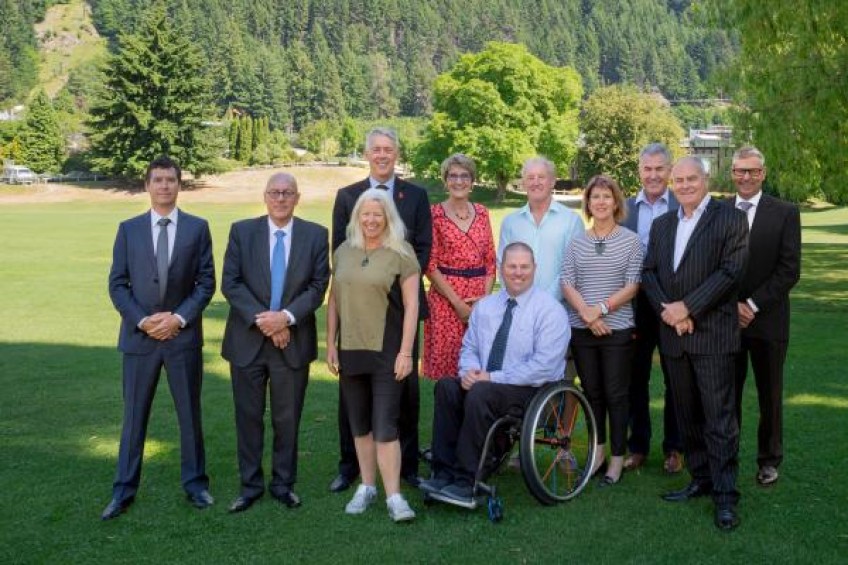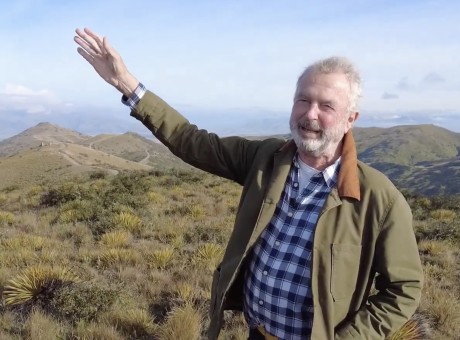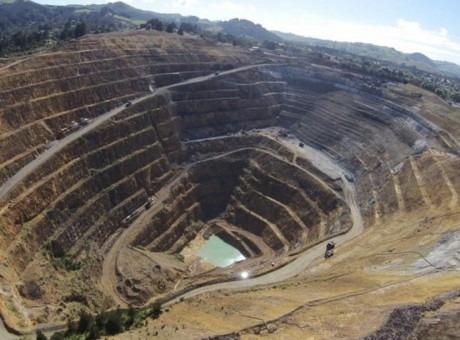Our local council. Doomed to be unloved and misunderstood?

It's a universal truth. All over the world council-bashing is a recognised mass participation sport. There's a general view that councils are populated by well paid bureaucrats who like to make our lives difficult. Councils have a guaranteed income - our money - and they're often accused of turning the process of local government into an impenetrable matrix of submissions, technical terminology and a sort of "democracy lite" approach where the elected officials appear to be in charge but the real power lies with the council managers.
Our own council, the Queenstown Lakes District Council, is having a go at challenging this sometimes entertaining game of them and us, which can also be both toxic and destructive when it comes to a community like ours trying to get important things done.
At the centre of this eye watering challenge is QLDC's Communications and Engagement Manager Naell Crosby-Roe. He's been in the job for almost a year so Crux thought the time was right to check in and see how it is all going. Here's editor Peter Newport's journey through the machinery designed to keep us on side with the council, including a detailed look at their own community scorecard.
In many ways a local council just can't win. When they do a good job everybody just says "well, that's what we expect." But when they make mistakes we are all onto them like a pack of dogs. Every negative adjective ever invented is rolled into service and it's often hard for council to defend themselves because they are governed by so many rules and by-laws that there's often little room for human compassion, empathy or forgiveness.
On the other side of the balance sheet we are expected to trust the council with our money and to run the complex business of keeping everything working. Water, rubbish, roads, dogs, noise, sewerage, planning, parking, buses, liquor licensing, building consents, zoning - you name it, the council does it. But not always perfectly.
We, the ratepayers and residents, own the council. They represent and work for us - that's the bottom line.
The truth is though that there is too much going on for the council to communicate on everything, and frankly few of us could be bothered to read that much information. That's where the council's communications team comes in. They have to pick and choose what they think we want or need to know and put out fires when a local fight develops. They also have to deal with the pesky media who sometimes want to have a dig around in the council's affairs to see if everything is ship shape, squeaky clean and above board.

Naell Crosby-Roe. QLDC's communications boss comes from a commercial background. "Anyone can sell TV's, but I like to do stuff I care about."
Most of that job now sits with Naell Crosby-Roe. Unlike many council comms people he is not from a journalistic background. He's from the UK and has a background in corporate communications, tertiary education and the charity sector. He's agreed to a Crux interview and we are walking through the cramped labyrinth that is 10 Gorge Road Queenstown - Council HQ. We pass a large, darkened office that paradoxically has a large, rather grand open gas fire burning ... a simulated log fire just like you'd find in an upmarket bar or restaurant.
"That's where the comms team work" explains Naell. He has a separate office that I'll visit later. We are climbing down some back stairs to a little used hidden entrance to the library - on our way to meeting room that's buried in among the books. After kicking out an errant backpacker who's in there using the free wi-fi, we get down to business.
Why did he take the QLDC comms boss job, I ask. "I think anyone can go and sell TV's" he says. "But I like to do stuff that I care about and I think the fact that this is an organisation and a district in a real growth phase is good. I love a challenge and from a comms perspective, it's a challenge."
I remind him that everyone loves to hate their local council. "I think you are right. It's like a byword for bureaucracy and red tape.There's frequently this view that the council's politicians aren't necessarily doing the right thing for the community. But I think the intent is always right. Not everyone in the community might agree with the choices that are made, but the intent is coming from a really good place."
Those same council politicians have just given Crosby-Roe and his comms team quite a bit more money to play with. In fact the communications budget has gone from $291,000 to $511,000 over the past year, although some changes have been made to the scope of this budget.

Communications spending has taken a huge leap in the past year. Source: QLDC.
Not only is the comms team powering up for the ever increasing work load handling social media - the QLDC Facebook page is followed by over 17,000 people - but the communications strategy includes what some people see as the old-school printed handout, Scuttlebutt. It costs almost $100,000 just in printing and postage but is often seen littering the floor of supermarket distribution points when smuggled inside local newspapers, and then rejected by readers. Scuttlebutt is also available online.

Scuttlebutt - worth $100,000 a year of ratepayer's cash?
But according to the council, Scuttlebutt is the most loved of all the different channels used to spread generally good news about what ratepayers money is being used for.
You might wonder how the council knows what we prefer. Well, the council does a very deep survey each year to find out exactly what we think of them - the good, the bad and the ugly. We've included a link to the full 2017 survey report at the end of this story. The report tends not to get very widely reported by the media (or at all) and it is literally a measure of how successful the council has been in the eyes of the residents. Before we get back to Naell Crosby-Roe, it's worth looking at some of the survey headlines as, in many ways, this is a scorecard of how well the council is communicating.
These surveys cost over $30,000 a go and there's hardly a question that does not get asked.
The latest survey concluded that both Queenstown and Wanaka residents were increasingly dissatisfied with their respective tourism promotion agencies - Destination Queenstown and Lake Wanaka tourism. Parking is our biggest problem. Use of community services is decreasing (things like libraries and swimming pools). But, according to the survey, we are generally satisfied with our council overall. To quote the survey "Female respondents and residents who are ratepayers in the district appear more satisfied with QLDC elected members, while female respondents are also satisfied with QLDC staff." Go figure.

Not looking good - some bad results for the QLDC in terms of regulatory services.
On the negative side of the balance sheet, the locals are not happy with the council's regulatory services - that's planning and consents mainly. The survey also notes "Satisfaction with freedom camping, parking enforcement and habourmaster activity has decreased significantly this year. Satisfaction with resource consents, building consents and LIM reports has also decreased this year."
As council documents go, this is an easy read. Some nice graphics make the numbers easy to understand and the survey is a useful guide to how much the council does - let alone whether we approve or not.
One of the questions I most wanted to ask Naell Crosby-Roe was whether the council comms team saw itself as a sort of local news agency or gatekeeper of information, especially with a lot of media presence in the district being cutback over recent years. He says they do get an enormous number of media enquiries from both within New Zealand and overseas, all of which adds to the work load.
I ask if it's appropriate for the QLDC comms team to become an ad hoc news agency or whether that would be a dangerous development. "I don't think we should be in that space. We are not a news agency. We have a clear role as local government and that is to make sure people are aware of the services we offer, that they are aware of the decision making that is going on, what the role of council is and that the community is involved in terms of consultation. I suppose the closest we would get to being a news agency would be in our capacity as an emergency management operation, which is a special case. In an emergency situation though we would be fronting our own news items."
This is really where the role of local council communications becomes critical. Whether we like it or not, the council runs our communities. But few of us would be happy with the "nothing to see here" approach from council, just as we probably would not be comfortable with the "trust us we're the professionals" or "it's too complicated, none of you would understand."

The council's score on consultation and communications - as rated by residents.
It's also worth considering how annoying we, as the public, must be to council staff. From their perspective, the public would always be complaining about the council, never praising. Some of us, sadly, think that verbally attacking council staff over the phone is OK because they work for us after all, don't they? Some people can't resist trying to do a deal or negotiate with the council when council staff have no power to agree such deals.
Others are convinced that the council staff and managers are over-paid and under performing, hiding behind red tape. Then there's the conspiracy theorists who believe that with $100 million sloshing around each year there's bound to be some dodgy deals with council contractors and property developers. It's like Russia and America during the Cold War - things escalate quickly and both sides become highly suspicious of the other. Its accurate to say that some sections of the media have seen the QLDC as fair game in terms of tabloid headlines. Shooting fish in a barrel is a phrase that comes to mind, but of course the council then has to spend a lot of time defending itself, even if the media accusations sometimes carry little or no weight.
Does Naell Crosby-Roe have an answer to this nasty cycle of mutual suspicion between the council, the public and the media?
"Essentially we just try and tell people as much as we possibly can without swamping them. We have to stay across the media, we have to try and refine the message down to one that is easily digested so people have sufficient information to make informed decisions. There's a fine balance between giving people too much information. They just switch off because some of these issues are really complex as soon as you get into regulatory issues and building issues that can be really tough for people. So it's just giving them enough so they can make an informed decision, but doing it in a way that they feel engaged and they want to actually be a part of that conversation. It's a constant balancing act. "
I ask if the arrival of digital media and social media makes the council communications job harder or easier?
"I would say it's a double edge sword. There's always the challenge. How do you reach busy mum and dad who are working, who don't have time to come to a meeting, who don't have time to read the local papers. But they're online because they might be commuting or taking a lunch break. So it's great from that perspective. On the flip side of that is that social media, digital marketing, digital comms is a very hungry beast to feed. You can't just sort of set it up and let it lie because we want to use it as an effective channel."
Crux currently has a complaint with the Ombudsman over QLDC trying to charge us for access to information. Our view is that it is a core council responsibility to be transparent and make all infromation accessible in a timely manner, free of charge. The council decided in January this year to start charging for information. This is all part of a key piece of local government legislation called the Local Government Official Information and Meetings Act - LGOIMA for short. Part of this legislation means the supply of council information can take up to 20 days. The Crux complaint, and an investigation by the Ombudsman's office, is ongoing. Both the Mayor and council CEO are on record as supporting transparency, as is Naell Crosby Roe.

Naell Crosby-Roe. "There's nothing malevolent going on."
"Council staff and managers are all people. We're also ratepayers . We also have to park and travel and use the facilities. So there's nothing malevolent going on. I think if we can give council more of a face, not just the elected members, but the officers who work here day in, day out then hopefully people will appreciate us more. We're real. We're doing this for the right reasons"
So transparency would come with that territory wouldn't it?.
"Yes, absolutely. And it comes back to the law and the fact that everything that council does is based on the principle of transparency. Anybody can come to us and ask us for stuff and that's the position that we have to take and we want to take."
So that's clear then. We finish up in Naell's very modest office which he shares with two other managers from Human Resources and corporate services. His boss, former journalist Meaghan Miller who is General Manager - Corporate Services, is based nearby in a separate office. I do find it a bit odd that he does not sit with his comms team, but space is limited and there is a big office reorganisation coming up with a move to one of the council's other town centre offices.
I have to say that I have found Naell Crosby-Roe warm, straightforward and authentic in my dealings with him. Let's hope that he's got the council's senior leadership team on board with his mission to make the council both loved and understood. It's all about transparency.
Read: The full 2017 residents' survey on the council's performance.
























